SciPost News
Previous Page 8 of 13. Next Go back to the homepage.
A. Morin-Duchesne and J. L. Jacobsen receive the Select label
30 September 2019

"Logarithmic correlation functions for critical dense polymers on the cylinder" by Alexi Morin-Duchesne and Jesper Lykke Jacobsen has received the Select label. Warm congratulations to the authors!
In this paper, the authors have studied the complex issue of correlation functions in the dense polymer problem. Demonstrating formidable mathematical skills, they are able to express the results in terms of integral formulae and hypergeometric functions. These lattice results were then used to compute structure constants and ratios that appear in the operator product expansions of the boundary condition changing fields. The log-conformal field theories presented in this paper are of special interest in the field of condensed matter theory, as they represent the case where some of the fields are logarithmic instead of primary and thus do not undergo simple multiplicative scale changes under dilation. These results can lead to better understanding of many interesting models like the sandpile model, dense polymers, and critical percolation.
P. Armagnat et al. receive the Select label
11 September 2019
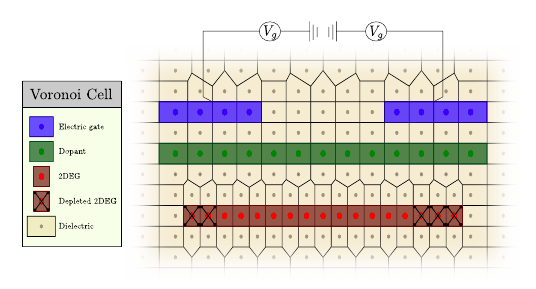
"The self-consistent quantum-electrostatic problem in strongly non-linear regime" by Pacome Armagnat, A. Lacerda-Santos, Benoit Rossignol, Christoph Groth and Xavier Waintal has received the Select label. Warm congratulations to the authors!
In this well written and detailed paper, the authors propose an effective method to solve "the self-consistent quantum-electrostatic problem" at zero temperature. Commonly, this problem has been avoided, but the authors of these paper present a stable algorithm that provides a solution to this problem with controlled accuracy. The main result of the manuscript is eliminating the convergence issues of the Schrodinger-Poisson problem and reducing the necessity to perform computationally intensive steps of quantum simulation to only a few iterations. Overall, this proposal can be very valuable to many researchers that have to address this problem in some form in their modelling of physical phenomena.
P. Kubiczek et al. receive the Select label
2 August 2019

"Exact real-time dynamics of single-impurity Anderson model from a single-spin hybridization-expansion" by P. Kubiczek, A. N. Rubtsov and A. I. Lichtenstein has received the Select label. Warm congratulations to the authors!
This novel paper presents a new computational approach for dynamics of quantum impurity models and other relevant topics for the condensed matter field. In particular, the authors present a modified real-time continuous-time hybridization-expansion quantum Monte Carlo solver for a time-dependent single-orbital Anderson impurity model. The presented method alleviates the dynamical sign problem by reducing the order of sampled diagrams and makes it possible to reach twice as long time scales in comparison to the standard method. This method is illustrated by calculating electric current through impurity in paramagnetic and spin-polarized cases. The idea of expanding around one single spin flavour could lead to further developments in the understanding of the cross-over between Falicov-Kimball and Hubbard physics.
Y. Gobeil et al. receive the Select label
1 August 2019
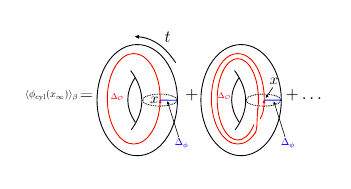
"Thermal conformal blocks" by Yan Gobeil, Alexander Maloney, Gim Seng Ng and Jie-qiang Wu has received the Select label. Warm congratulations to the authors!
This innovative article explores a foundational problem of determining the conformal blocks for a conformal field theory (CFT) at finite temperatures. They solve this issue for the specific case of one-point thermal correlators. The combination of field theoretic and holographic techniques gives confidence in the veracity of the result, and suggests how one might extend their result to other related blocks. This topic has not been explored in detail before, and therefore this article establishes the groundwork for future research.
V Alba et al. receive the Select label
8 July 2019
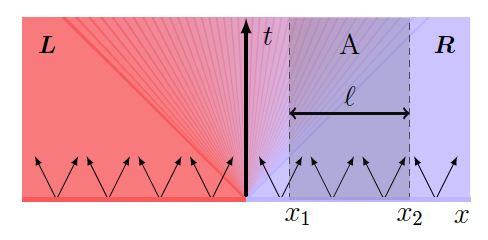
"Entanglement evolution and generalised hydrodynamics: interacting integrable systems" by Vincenzo Alba, Bruno Bertini and Maurizio Fagotti has received the Select label. Warm congratulations to the authors!
In this very readable paper, the authors study the entanglement evolution of integrable quantum models. In particular, they focus on the entanglement entropy after a global quench from inhomogeneous states. They combine the ideas of pair particle production with the formalism of generalised hydrodynamics to develop a formula capturing the dynamics of the entanglement entropy. They found that the half chain entanglement rate depends only on the physics at the interface, and it differs from the rate of exchange of thermodynamic entropy. This contrasts with the behaviour in free or homogeneous interacting integrable systems, where the two rates coincide. These results were tested in the Heisenberg chain, finding good agreement with DMRG simulations. This paper makes interesting points regarding the definition of the entanglement entropy, and it calls attention to several interesting directions for future research.
University of Amsterdam provides substantial grant to SciPost
10 June 2019

The University of Amsterdam has recently granted 60k to SciPost. This donation makes the UvA the most generous sponsor of our initiative up to now. We will make use of these funds to further develop our services and accelerate our expansion plans.
As background to this, we have talked to Gerard Kohler from the UvA's central library. In the short interview hereby linked, he talks about the background reasons for this support, and his hopes for the future.
In memoriam: Prof. dr Olga Borisovna Igonkina
21 May 2019
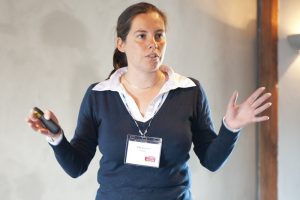
It is with great sadness that we mark the passing of Prof. Olga Igonkina, Nikhef particle physicist and prominent member of the ATLAS experiment at CERN. She passed away on Sunday May 19th in Amsterdam, The Netherlands, at the young age of 45.
Prof. Igonkina was a prominently active contributor to SciPost, having organized the proceedings for the 15th International Workshop on Tau Lepton Physics (Amsterdam, 2018-09). She was a Fellow of our Editorial College and was always much appreciated for her dedicated hard work and ethics. We will miss her greatly. We express our most sincere condoleances to her family, friends and further colleagues.
Vladimir Bashmakov et al. receive the Select label
15 April 2019
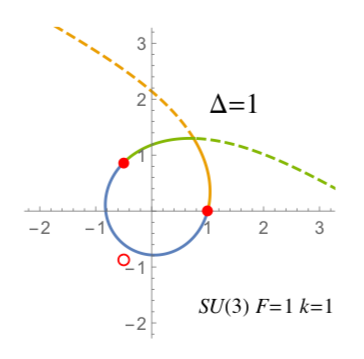
"Living on the walls of super-QCD" by Vladimir Bashmakov, Francesco Benini, Sergio Benvenuti, Matteo Bertolini has received the Select label. Warm congratulations to the authors!
This excellently written paper concerns the 3d theory that lives on
the domain walls of SQCD with less flavors than colors. It contains
nice insights into the interplay between 4d bulk physics and 3d
worldvolume domain walls physics. In particular, the authors propose a
class of three-dimensional Chern-Simons-matter theories to describe
the effective dynamics on the walls. Moreover, they present several
interesting results in the topic, including successful non-trivial
cross-checks of their proposal. In addition, they also provide a
review section that clarifies their presentation. Overall, these
results will be useful in future explorations of 3d non-supersymmetric
QFTs and their connections to 4d physics.
SciPost top of the class at Crossref metadata
27 March 2019
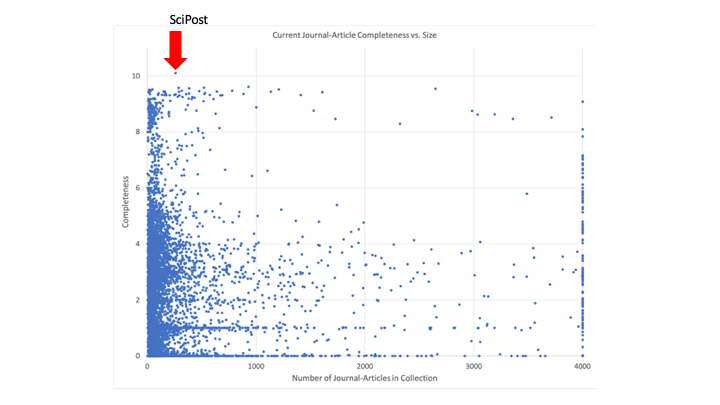
An independent study of scientific metadata collections has recently highlighted the quality of our publishing services. We cannot do better than quote the spontaneous communication we recently received from Dr Habermann:
I am a "metadata guy" in Boulder, Colorado and have recently been working to characterize scientific metadata collections in many repositories around the world. I recently took a look at the CrossRef Participation Reports and implemented a simple quantitative measure of completeness of these collections and a simple plot that compares completeness over time. I am using this approach to try to understand evolution of CrossRef metadata through time. As part of this work I looked at completeness as a function of collections size. The original dataset was a sample from CrossRef. I recently updated the sample to include all CrossRef members.
I am happy to let you know that SciPost has the most complete metadata of all 8670 CrossRef members with current collections of journal articles.
The attached Figure shows the data and you can see that SciPost clearly stands out. […]
Great work,
Ted
Readers can find more details of this study on Dr Habermann’s blog.
We are very grateful for this very interesting and rewarding piece of information, which, besides confirming the top-quality of our services, interestingly points to many aspects of metadata systems (ours and those of others) which can still be improved.
Michael M. Cawte et al. receive the Select label
13 March 2019
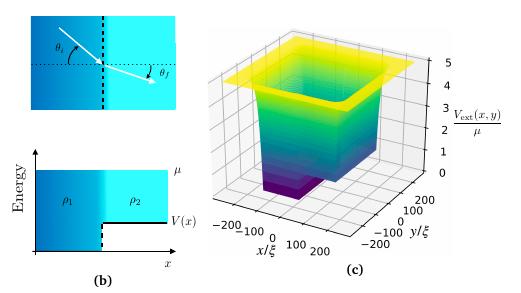
"Snell's Law for a vortex dipole in a Bose-Einstein condensate" by Michael M. Cawte, Xiaoquan Yu, Brian P. Anderson, Ashton S. Bradley has received the Select label. Warm congratulations to the authors!
This paper provides a useful guide for the behaviour of vortex dipoles as they pass through interfaces of sharply changing density, including a thorough numerical study and consequent analysis. As part of this analysis, the authors compare the values of the reflection/refraction vs. incident angles in vortex dipoles with a Snell’s law-like analytical prediction, achieving good agreement between the two before and after the interface. However, the authors found that when passing near the interface the dipole can exhibit dynamics that depart significantly from standard ray optics, involving transient capture by the interface. They conclude that despite the added complexity, an analogue Snell’s law is still applicable for the incoming and outgoing dipole paths when interacting with a sharp interface. This interesting and thorough study could guide future experiments on vortices in flattened geometries.
Previous Page 8 of 13. Next Go back to the homepage.
